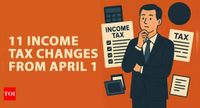As the new fiscal year kicks off on April 1, 2025, India is set to implement a series of significant changes to its income tax regulations, impacting millions of taxpayers across the country. These modifications aim to simplify the tax structure, enhance compliance, and provide relief to various segments of the population, including salaried individuals and senior citizens.
Among the most notable changes is the introduction of a revised income tax regime featuring new tax slabs and rates. Under this new system, individuals earning more than Rs 24 lakh will now be taxed at a rate of 30%, a substantial increase from the previous threshold of Rs 15 lakh. Additionally, the basic exemption limit has been raised from Rs 3 lakh to Rs 4 lakh, allowing more individuals to benefit from tax-free income.
Perhaps the most beneficial change for many taxpayers is the provision allowing individuals with a taxable income of up to Rs 12 lakh to pay zero tax. This initiative comes with a standard deduction of Rs 75,000 for salaried individuals, effectively making income up to Rs 12.75 lakh tax-free for those opting into the new tax regime. However, it is essential to note that this does not exempt individuals from filing their income tax returns (ITR); the zero tax benefit is accessible through a tax rebate under Section 87A of the Income Tax Act, 1961.
Furthermore, the Budget 2025 has introduced modifications to the taxation structure of Unit Linked Insurance Plans (ULIPs). Proceeds from ULIPs that do not qualify for exemption under Section 10 (10D) will now be classified as capital assets and fall under the equity-oriented funds category. This change means that short-term gains will incur a 20% tax, while long-term gains will attract a 12.5% tax without the benefit of indexation. However, tax exemption under Section 10 (10D) remains applicable for ULIP proceeds where the annual premium is below Rs 2.5 lakh.
In an effort to streamline tax collection, the Budget has also announced adjustments to Tax Deducted at Source (TDS) rates and thresholds. Starting April 1, 2025, a uniform TDS rate of 10% will apply to income distributed by securitisation trusts to resident investors. Additionally, elevated thresholds will be introduced across several sections, including 193, 194A, 194, and more, enabling taxpayers to retain a greater share of their income.
Another significant change is the removal of the requirement for increased TDS and Tax Collected at Source (TCS) rates for individuals who have not filed their ITRs. This revision aims to alleviate the compliance burden on taxpayers, as the government acknowledges the challenges in verifying whether returns have been filed at the time of deduction or collection. The Budget memorandum states, "Representations were received from various stakeholders that it is difficult for the deductor/collector, at the time of deduction/collection, to verify whether returns have been filed by the deductee/collectee, resulting in application of higher rates of deduction/collection, blocking of capital and increased compliance burden."
Moreover, the Budget has incorporated NPS Vatsalya contributions within Section 80CCD, allowing taxpayers who continue with the old tax regime to avail deductions for their contributions. Additionally, the tax-free perquisite thresholds for employer-funded international medical treatment expenses have been revised, providing further relief to employees.
Starting April 1, 2025, individuals will also benefit from an extension in the timeframe for submitting updated returns, which has been increased from 24 months to 48 months post-assessment year. This change provides taxpayers with additional time to rectify any discrepancies in their filings.
To simplify the process of calculating annual house value for taxation, the authorities have streamlined the valuation process, allowing homeowners to declare nil value for any two properties. This change aims to ease the tax filing process for property owners.
Beginning April 1, tax officials will conduct comparative analyses between current and previous Income Tax Returns (ITRs) to identify discrepancies, although specific details on the types of discrepancies to be examined have yet to be disclosed.
In addition to the changes in income tax regulations, other financial rules will also take effect on April 1, 2025. For instance, the Unified Pension Scheme (UPS) will launch, providing central government employees under the National Pension System (NPS) with a pension equivalent to 50% of their average basic salary after 25 years of service. Furthermore, the TDS exemption limit on interest income for senior citizens will increase to Rs 1 lakh.
As part of ongoing efforts to enhance consumer protection, new regulations will also impact online shopping in Türkiye, effective April 1, 2025. Sellers will be required to provide clear product details, including safety information, and must remove misleading listings within 24 hours. E-commerce platforms must establish direct contact points for consumers to report unsafe products and submit complaints.
In North Dakota, new licenses will be required for anglers, hunters, and trappers starting April 1, 2025. These licenses can be purchased online or at various vendor locations throughout the state, marking a new chapter in outdoor recreational activities.
With these significant changes coming into effect, taxpayers and consumers alike are encouraged to familiarize themselves with the new regulations to ensure compliance and take full advantage of the benefits available under the revised systems.







